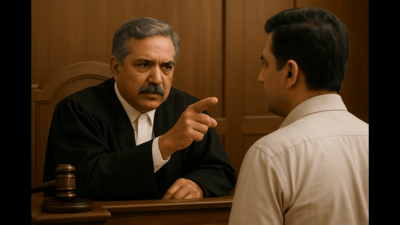ARTICLE AD BOX

In recent months, at least five senior IAS officers have been pulled up by judges in Madras high court
D Govardan“The Madras high court judges order the police to get rid of the footpath hawkers around the court campus overnight. But the same judges pass stay orders on police when it comes to such hawkers on Anna Salai and Egmore.
If we try to reason with them, it is seen as contempt of court and officers are pulled up,” lamented R Rajagopalan, then Chennai police commissioner, at one of his weekly press briefings in the early 1990s.More than three decades later, the situation hasn’t changed much. In recent months, at least five senior IAS officers have been pulled up by judges in Madras high court. They include former chief secretary Shiv Das Meena and present chief secretary N Muruganandam, besides greater Chennai corporation commissioner T Kumaragurubaran.
Some of them were forced to appear in person or offer an unconditional apology.
A couple of weeks ago, IAS officials were accused of running a parallel govt in TN, while in another case the court had set a deadline for making a certain payment, failing which the chief secretary had to appear in person before the Madurai bench.While the judiciary’s role in upholding the rule of law is sacrosanct, the trend of top bureaucrats being hauled up for non-compliance or delayed execution of court orders reflects poorly on governance.
These developments cannot be brushed aside as something between the judiciary and individual officials. Prompt action and corrective measures, where possible, could check this trend and redeem the administration in the eyes of the public.“Of the 50-odd judges in the Madras high court, only a few individuals resort to contempt of court orders. One institution is not against another,” says retired Madras high court justice V Parthiban.
“Normally judges consider matters leniently as they are aware that officials are burdened with a heavy workload. Only some orders are implementable. I myself have given extended timelines to implement orders. But when officials view court orders with disdain and impunity, one needs to step in.
”Justice Parthiban cites a case that involved allotting a two-acre land parcel to an individual in lieu of some land acquired illegally by the govt.
“The official kept delaying it until the 2021 assembly election notification and then, sought to take cover under the model code of conduct. ‘If nothing can be done during this period, can we shut the state secretariat until the model code ends,’ I asked that official, who realized his folly,” says Parthiban.Issues arise when the judiciary gets into the implementation part and usurps the role of the executive, says a civil servant, who was earlier pulled up by a court.
For instance, a court steps in and offers financial relief to an individual and asks the govt to implement it. But this could have statewide ramifications and eventually cost the govt around `2,000 crore,” he says. “There are thousands of cases pending in various courts for decades.
Who will ask the judiciary to clear them all within a timeframe,” he asks.Retired civil servant K Ashok Vardhan Shetty says a standard operating procedure (SOP) was issued by the supreme court in Jan 2024 for all courts on when and how senior govt officers may be summoned for personal appearance.
“Problems arise when some high courts or judges bypass the Supreme Court’s SOP, directly summoning secretaries or even chief secretaries,” he says. “While some delays by govt officers are genuine, they must be seen in context; the secretary handles hundreds of files weekly, many requiring clearance by multiple officers, departments and ministers. No senior officer will ever indulge in persistent non-compliance or wilful disobedience of court orders,” he adds.Shetty says delays in govt can be reduced if secretaries and senior officers adopt a monitoring system to implement court orders, with weekly reviews by second-level subordinates, fortnightly reviews by first-level subordinates and critical cases flagged for the secretary’s personal follow-up. Recalling his own career, Shetty says it was his goal to be never hauled up for contempt. He was still summoned twice; once when a judge ordered his appearance before the appeal period had expired, and once within a month of joining a post owing to his predecessor’s delay.
These occurred before the SOP.Former Madras high court justice D Hariparanthaman is okay with civil contempt, but says there is no place for criminal contempt in a democracy. “The recent hauling to court of IAS officers is civil contempt. But the cases involving advocate Vanchinathan and earlier writer Arundhati Roy are criminal contempt. Criminal defamation and criminal contempt are not there in any other democracy and we should be worried about that most,” he says.While the debate around judicial overreach and administrative discretion continues, one thing remains — when it comes to civil disputes between the govt and ordinary citizens, there is no justification for delay or defiance. Officers must act with empathy and urgency to implement court orders that are reasonable and doable, not just as a matter of legal duty but as a reaffirmation of the govt’s commitment to its people.
After all, officials are the first port of call for aggrieved citizens. Courts come in much later.Eye on ContemptThe Supreme Court’s standard operating procedure (SOP): # Senior officers should not be summoned routinely or to coerce under contempt threats;# Courts should first operate through law officers who represent the state;# Summoning a senior officer should be a last resort, justified only in cases of persistent non-compliance, wilful disobedience, or compelling necessity for personal input; # Video conferencing should be the default mode for appearances, with advance notice for preparation# Physical presence should be rare, time-slotted and only when unavoidable.# Officers must not be made to wait or stand unnecessarily, and judges should avoid humiliating remarks.# High courts were directed to embed these principles into their own procedural rules.(The writer is a Chennai-based journalist)Email your feedback with name and address to southpole.toi@timesofindia.com



.png)
.png)
.png)
















 2 hours ago
3
2 hours ago
3









 English (US) ·
English (US) ·